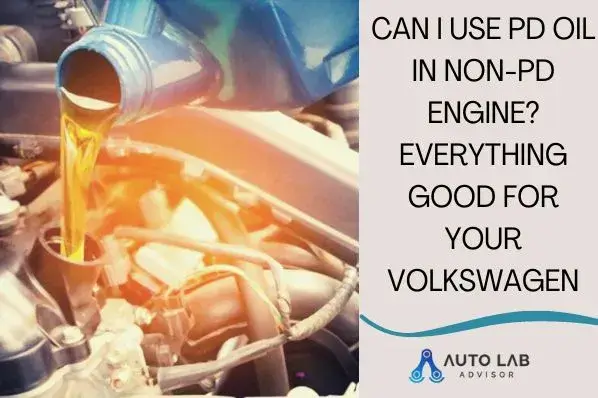Suppose you drive around the town in your pre-2004 Volkswagen, cross over 100 miles with it and when you finally have time to stop and check, you discover that your trustworthy mechanic has actually put PD oil in your non-PD engine.
No matter what horror it brings to you, the wiser question would be to ask, can I use PD oil in non-PD engine? Yes. As long as the oil that you or your mechanic has used in your non-PD engine meets the specifications for the AFN (which should be the 505.00 oil), your engine will be fine despite using it.
Actually, non-PD engines aren’t normally as fussy as a PD engine. So it is doubtful that there’ll be any damage to the engine or its performance.

Can I Use PD Oil In Non-PD Engine?
Yes. You can use PD oil in your non-PD engine. For an oil suggestion, you should pick a brand that can give you rapid oil delivery at optimally low temperatures, high lubrication, extended engine service, excellent protection against wear, and engine cleanliness sealed with great aging stability.
For this, the 5w40 CJ-4 synthetic oil, Liqui Moly 2332 Leichtlauf High Tech Engine Oil would be perfect.
Non-PD engines aren’t as picky as PD engines so any good diesel PD 5w40 motor oil will be suitable for your A4 engine and still be able to generate high performance.
But if you had gotten PD-TDI engines, you would need to abide by a very specific oil requirement in that case (VW 505.01). Thankfully, non-PD engines don’t have any such requirement.
What Is Recommended By Volkswagen For Their Non-PD Engine?
VW has recommended the VW 505 00 Oil for their non-PD engine. This has been formulated for the previous versions of VW TDI/TD/non-turbo/diesel engines. If you have a non-Pumpe Duse TDI diesel engine on your VW, manufactured before ‘04, this is the oil specification that they recommend.
The Americans particularly used the VW 505 00 oil specification in the following engines:
- 1993-1999 Volkswagen 1.9L D/TD/TDI diesel engines
- 1999-2004 Volkswagen 1.9L TDI diesel engines with code ALH
Why Should I Take The Trouble Of Making Sure The Diesel Engine Gets Proper Oil?
Your engine needs clean oil so that it can properly lubricate the moving parts inside it, already running under high temperatures.
When you get diesel engine oil, you increase its need to sustain more soot than it would have if you had chosen gasoline engine oil. Your TDI likely has both engines, and hence, you should be using proper oils. Otherwise, it might void the warranty you would have from your engine.
For the same reasons, you can use PD engine oils on earlier pre-pump duse (PD) engines. But doing so and vice versa is not what you call proper oil selection for your engine. PD oil might not be necessarily better for your non-PD engine that doesn’t really require it. However, the use of PD oil in a pre-PD engine is approved by Volkswagen.
What Can I Do If My Mechanic Puts PD Oil in My Non-PD Engine?
If your mechanic has done so with or without you finding out, there’s no need to panic. While it may be something new for those who faced such a situation the first time, you will find mechanics often doing so, even owners claiming that they themselves asked their mechanic for such a change. So don’t worry about it!
Why Is Correct Oil So Important For My Engine?
The reason why correct oil is important for your TDI engine is because since it has its piston rings super close to the combustion point, regular oils may leave unwanted deposits on these rings, hurting their functioning and increasing oil consumption.
The deposits or oil cokes can further clog the feed line starving the turbo engine of oil. This is why you should always make sure that you are using the correct oil in your engine, be it a PD or a non-PD engine.
Oil Standards and Specs
While VW has its own standards and specs for its engines, there are other established industry standards that you can follow for choosing your engine oils.
If the PD oil that you used in your non-PD engine did not meet the VW standards, however, it met the standards of ACEA or API, it will still be fine for your VW. In fact, other PD oils may make your non-PD engine perform even better than using the ones specified in VW’s specifications.
For future record, when you need to have a warranty claim, VW might ask you for proof that you have used only their oil specs.
Synthetic vs Non-Synthetic
Oils that meet your standard for the TDI engine are mostly synthetic. However, some of them may contain a mineral oil base or esters. In which case, as long as the oil itself meets the standard, you’re good to go with that “synthetic technology” label.
FAQs:
The benefits that you get from the PD oils actually make it worth your while. The PD symbol that you see indicates that each of the injectors in the engine has its own pump. In such a setup, you have a very high working pressure (which might amount to as high as 2000 bar). As a result, what you get is finer fuel spray and more complete and better combustion. This results in overall better control of the volume of fuel injected as well as the time taken to inject so.
An engine that has one pump for each of its injectors instead of having one prime injector pump is a PD engine. Here, PD stands for Pumpe Deuse.
Non-PD engines are those which have been made by VW before the year 2004. These are non-Pumpe Deuse engines.
Yes. VW engines are reliable and have great engine power. So many users have hailed goof reviews on their PD and non-PD engines.
